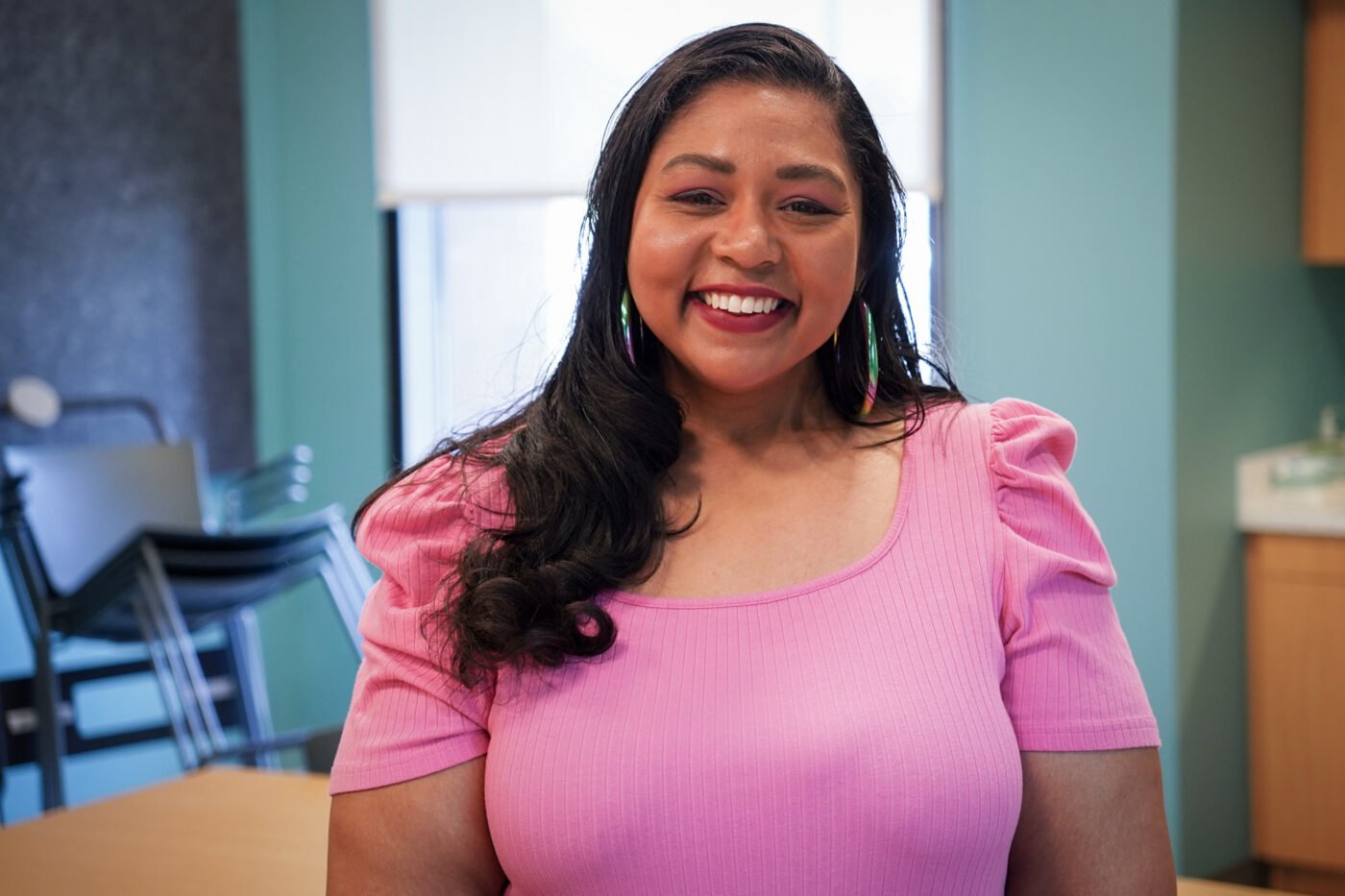
Portland City Councilor Candace Avalos says a new City of Portland governing body with strong police oversight needs representation from transportation advocates. And with applications to serve on the Community Board for Police Accountability due before April 15th, Councilor Avalos believes now is a golden opportunity to make sure Portland’s definition of public safety includes safe streets.
On Friday I sat down with Avalos in a conference room in Midland Library to talk about policing and transportation. Avalos, who represents an area east of I-205 including Lents in southeast and the Portland Airport, is a first time member of city council, but she’s no stranger to local politics. She was chair of the Citizen Review Committee, where she served for six years and became a well-known advocate for police accountability.
The impetus for our conversation was the CBPA, a new, high-profile venue for oversight of the Portland Police Bureau. The 21-member governing body will have its own budget, will hire its own investigators, and will issue binding decisions regarding police practices, policies, and directives with a primary focus on community concerns.
It’s crucial that this new CBPA have at least one member who understands how transportation issues relate to public safety and policing. It’s my hope my interview with Councilor Avalos encourages someone in our audience to apply for one of the positions.
Listen to our conversation in the player above or wherever you get your podcasts. You can also read an edited version of the interview below.
How do you connect the dots between transportation and policing?
“When we think about policing and public safety, we tend to limit it to things like crime or gun violence and things like that. But as we know, in east Portland in particular, which has 28 out of 30 high crash corridors, transportation safety is a huge part of public safety.
As we’re making decisions about improving [transportation] it needs to include the fact that many of our communities are dying needlessly on the streets and are being hit by cars. And in east Portland, it’s particularly harsh.”
How do you feel about using automated cameras to enforce traffic laws?
“I am open to the discussion. I think that it’s definitely in a tool that we should explore… In general, about traffic cameras, I feel that they have good intentions. I worry about where we decide to put them, and how that affects certain populations.
[On the campaign trail] I heard a lot from east Portlanders that they felt that the streets were just kind of reckless, that people were driving very quickly. I had a lot of complaints when I was knocking on doors about people driving quickly through the neighborhoods too, not just on the main streets. And so, yeah, I feel like I’m open to [speed cameras] and concerned about what the impacts might be disproportionately on a community that you know is already facing so much hardship.”
How would you characterize the current relationship between police and the community?
“The temperatures are down, and I think in all areas it’s less politically-charged that it was, for sure. That definitely doesn’t mean that people aren’t paying attention, but I think the energy is a lot less…
I think that just having a leader [new (since the George Floyd protests) Police Chief Bob Day] that has earned the trust of many different aspects, I think has really shifted the dynamic.
I really do like Chief Day. I think he’s personable, I think he’s reasonable. When I have discussions with him, I see him really trying to come to a decision that is fair. And I think that has shifted the relationship, for sure…
I think right now, the police union sees their relationship with the city is, like, tenuous, right? Because they don’t necessarily have all of the more overt champions that they have tended to have on the council in the past.
… I wouldn’t say we’re in a positive place, but I would say a neutral place, with community.”
Why should transportation reform advocates and people who care about street safety, be paying attention to the Community Body for Police Accountability?
“I think it’s important for people to engage in this new process because we have created a really robust, really unique in the country, type of board, as far as the powers that we gave it.”
How is the CBPA more powerful than what came before?
“That old system has a lot of flaws. I think the main flaw there was the lack of true teeth in that process and everything really was just deference to police… It’s a system that does not have any true accountability because everything was so deferential to police in the first place. So that is the biggest change in this new police board, is that the people on the board actually have a lot more control. The standard of evidence is different.
… So I’m hoping that this new board, with its new teeth, will be able to usher in a new awareness about what we should expect from our police, and what does it mean to hold them accountable?”
What element of the CBPA are you most excited about?
“I’m excited that this board will actually have teeth… We wrote it in [to the bylaws] that the city has to respond to recommendations… We specifically did that so that when community does come and say, ‘Hey, we’re having these issues with these, you know, these police chases [for example], and it’s affecting the streets in this way,’ they’re going to have to respond by charter. So that’s really exciting to me, that the charter really instituted strong protections for the people’s voice in the process.”
With protest season ramping up, how confident are you that the Portland Police have learned lessons from past years and will change how they respond?
“I am very concerned, and I want to see police’s response to the fact that traffic, traffic attacks, car attacks, are on the rise. I was just having dinner with a friend who’s not plugged into politics, and she brought up to me how scared she was that this is the new norm — that protesters on the streets are getting run over…
I think that is a really important transportation justice issue, because I see that is an important place for police to intervene, in my opinion, protecting people’s rights to protest and ensuring that they’re not going to have somebody try to violently attack them with a car. So I would, I would like to see them increase their strategy for how to protect people.”
What can transportation advocates do to get street safety on the radar of the police in a bigger way?
“I think helping us reshape the narrative, like using these advocates to tell these stories and show how they fit into a larger public safety concern. I think that could be a really good place for advocates to start, because it’s not just police not making that connection. It’s also the city and it’s also the average Portlander. So how do we elevate that issue and show its relevance to public safety?”
Do you think now is a good time for transportation advocates to put police accountability on their radar and get involved with this?
“I do. I really think it’s important that transportation advocates elevate the dangers that we face just navigating our streets as non-car users, and that that needs to be again, part of the strategy for how to protect people so that they can move free the freely around the city.
It’s not about protecting them just from gun violence or crime or theft. It’s also to make sure that they can get from A-to-B safely. And that does depend on enforcement. It’s an enforcement thing, it’s a culture thing, it’s an infrastructure thing; but I think transportation advocates should use this opportunity to elevate that so that then the leaders can continue to make it part of our culture and decision making when we’re talking about public safety and when it comes to budget and enforcement and policing.”
Applications for the CBPA are being accepted through April 14th. Apply online here. Read more about the CBPA in the Portland Mercury.



